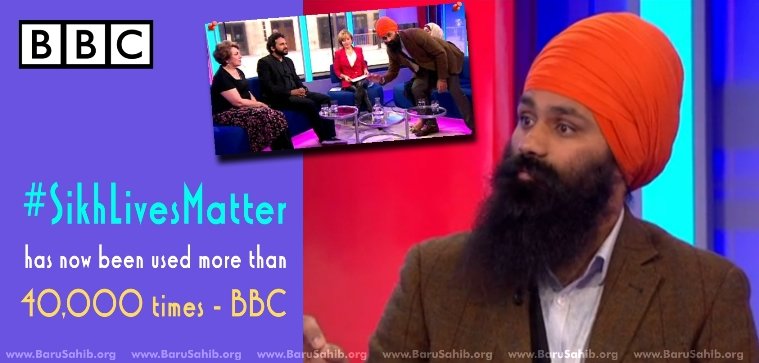After the deaths of two protesters in India, Sikhs around the world have been using online protest tactics to highlight what they say is injustice – and one supporter went off-topic on a BBC TV programme to make his case. “Sikh Lives Matter” has now been used more than 40,000 times, has spread to other […]
After the deaths of two protesters in India, Sikhs around the world have been using online protest tactics to highlight what they say is injustice – and one supporter went off-topic on a BBC TV programme to make his case.
“Sikh Lives Matter” has now been used more than 40,000 times, has spread to other social networks such as YouTube and Facebook, and was surging again on Monday.
When pages of the Guru Granth Sahib, Sikhism’s central text, were found ripped up, protests spread across the Indian state of Punjab. Police used water cannons, batons and live rounds to disperse the crowds, and at one protest last week police opened fire, leaving at least two dead and more than 50 injured, according to reports. One of those shot, 27-year-old Gurjit Singh, had reportedly gone to give food to the protesters, according to an interview with his father by the Indian Express newspaper. Online and in the streets, a movement quickly sprang up. Tweets showing his body, and photos of other injured protesters were shared widely along with the hashtag “Sikh Lives Matter” on Twitter.
In the UK the campaign got another shot of notoriety when Jagmeet Singh – representing a Sikh point of view and from the educational charity Basics of Sikhi – appeared on BBC One’s Sunday Morning Live programme. After a studio debate about interfaith marriage, Singh went off-topic, stood up in front of the camera and interrupted presenter Sian Williams, saying: “Sikhs are being killed in Punjab and nobody is reporting it, please report it.”
Online, protest messages are coming not only from India but from large Sikh communities abroad – especially the UK. One of the first people to re-ignite the hashtag’s popularity was Bally Singh, based in Wolverhampton, who tweeted: “Police violence towards our peaceful Sikh protestors should not go unnoticed.”
“Sikh Lives Matter”, which borrows its language from US protest movements such as “Black Lives Matter” and “Muslim Lives Matter,” actually began in the US too – where it originally was used to highlight the bullying of Sikh children who are sometimes confused with Muslims. But it’s been used in recent days to highlight the events in India and rail against Western media reporting, a big theme of the protests. A petition to the BBC on Change.org has received more than 70,000 signatures. It calls for more coverage of the story and for coverage of India’s treatment of its Sikh citizens.
“The BBC is covering this story online and on radio and it has been discussed on the BBC Asian Network,” the BBC press office said in a statement. The story has also been covered by the BBC’s Hindi language service.
~ Source- bbc.com

